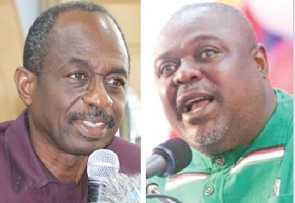Press Releases of Tuesday, 30 June 2020
Source: Aviance Ghana
The price of inaction
Aviance Ghana was the leading airport ground handling company in a highly lucrative sector in the nation. With a track record of over a quarter-century of operations at Kotoko International Airport, the company has served many of the top international airlines. As the company struggles with air travel restrictions and the impact of the COVID pandemic on its business, it’s worth noting the history of the company which could have once been the jewel of the Ghanaian aviation sector, much of which been shared by a concerned member of the Ghana National Association of Teachers who has spoken to us on condition of anonymity. It is a story of mismanagement, missed opportunities, and corporate greed.
Who pays the price? The company's employees and Ghana's teachers who have not earned a single Cedi on their investment in the company.
In 2007 Abraaj Capital, the now-defunct private equity group whose founder is facing criminal charges in the UK, acquired a stake in Aviance Ghana and would become the only shareholder in 2014. Shortly thereafter, Regimanuel Grey acquired 40% of the company. Employing some financial engineering manoeuvres Abraaj collapsed its substantial acquisition debt of almost $18 million, onto the company, and employed creative accounting to balance the books. That debt and its interest would become a burden on Aviance’s cashflows until today. The following year the Ghana Airport Company Ltd. (GACL), issued a cargo handling license to Swissport, introducing a new competitor to the formerly two-player market that had been served by Aviance and AHS-Menzies.
Nonetheless, in 2016 Abraaj was still able to persuade the Teachers Fund to buy its remaining 60% stake of the company for a generous price. The Abraaj executive who brokered the deal became Chairman of the board of Aviance. Meanwhile, the Teachers Fund, now the majority shareholder, would guarantee the company debt knowing full well that the company will never be able to repay the debt! In other words, the Teachers Fund will pay the bank's debt!
Later that same year, Aviance was granted an extension of its operating license by GACL; that license had been due to expire in 2021 and the extension pushed the date to 2026. While this extension was essential to preserving the value of the business, it appears that Aviance did not fulfill its obligations as subsequently, GACL would make claims against the companies for not paying fees associated with the license. Without that license extension, the company will have to cease operations, terminate the employment of its staff, and the Teacher's Fund would have to repay the bank debt.
Following the Teachers Fund’s investment, the business prospects of Aviance began to show signs of strain. The company began to lose its cargo customers to Swissport, which had superior cargo handling facilities, better services and more attractive prices. Aviance needed to invest to upgrade its cargo offering, but cash constraints and the debt weighed down. Even so, despite its troubles, the Aviance brand remained strong and the company attracted regional and international investor interest, including Saudi-based NAS, a Nigerian private equity fund and a South African investor. Offers that were presented at the time suggested a company valuation of nearly $40 million. However, the directors of the Teachers Fund were unable to translate that interest into a viable exit for the investment. Had they proved to be more savvy dealmakers, they could have recouped the invested funds, which had never generated any dividends, and perhaps even generated a return. In addition, new shareholders would have likely also invested in business, ensuring the long-term success of Aviance, improving service at KIA and protecting employee jobs. But this was not to be.
Without a deal and with its shareholders unwilling or unable to make necessary investments, the prospects of Aviance continued to diminish. Customers losses extended beyond cargo as ground handling clients, such as British Airways, shifted to the competition due to Aviance’s poor quality of service and inability to match pricing. To make matters worse starting 2018 the two shareholders of Aviance engaged in open conflict and recriminations, abdicating leadership at a highly sensitive time for the company. In 2019, Swissport was granted a full license, including ground handling, presenting an existential threat to Aviance. Throughout this period the company’s directors continued to receive around GHC 5 million annually in renumeration!
It is with this history that Aviance entered the reality of the COVID pandemic. The shareholders have left the company ill-equipped to deal with the challenges of the crisis. The debt burden remains, while revenue has evaporated and critical support by way of investment is nonexistent. The cost of this dire situation is currently being borne by the employees, in the form of salary cuts and layoffs which the Employees Union is rejecting. The company barely has sufficient cash reserves to take it past the summer, and the questions remain:
How will Aviance's employees find jobs in such a difficult environment?
Who will be held accountable for the losses in the Teacher's pension fund?










